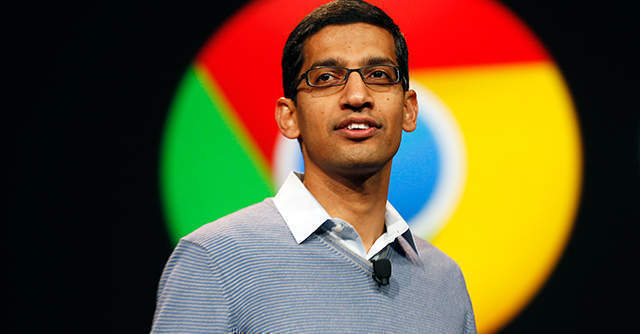
Can Sundar Pichai pull a Satya Nadella at Alphabet?


Alphabet CEO Sundar Pichai has many battles lined up ahead following his accession this week to the helm of affairs at the world’s largest and most popular search engine’s parent company.
He takes over the reins at a time when Google faces the most intense internal and external scrutiny since its inception, the famed days of the hip and transparent culture boom.
The 47-year old, Pichai, who was raised in Chennai, finds himself leading a company that has been long lauded for its openness and transparency. He will need to follow the company stated motto ‘do the right thing’ even as it moves towards transforming itself from a founder-driven firm to a corporate management, profit-driven path.

Pichai has to pull a Nadella
Time and again, complacency has been viewed as the Achilles’ heel at iconic technology companies that have transitioned from a founder-led culture to a professional corporate management.
Steve Ballmer would have driven Microsoft to the ground had it not been CEO Satya Nadella to the rescue. Post his appointment in 2014, Hyderabad-born Nadella went all-in on cloud computing. He revamped the organisation and its culture. For a company that always created proprietary software, Microsoft has turned 180 degrees with the recent acquisition of open-source coding platform GitHub.

Microsoft released its Office suite of software on the iPad, drastically changing the legacy relations with rivals. Once upon a time, Windows OS was everything at Microsoft. Just as everything at Google revolves around advertising. Over time, cloud platform Azure took over. This evolution is not all Nadella’s doing. But Nadella also lived up to investor expectations. Microsoft’s share price has ballooned over 300% since he stepped in as CEO.
Pichai is yet to show such a transformational streak or come into his own. The trillion dollar question the company faces is, will he, as Google approaches the trillion-dollar mark in market capitalisation.
Nadella has brought transparency and openness to Microsoft’s culture. He is not a conservative leader. He is assured and confident.

Under Pichai, Google has seen its Friday casual town halls being turned into a monthly affair. From being a platform to discuss culture and company policies, it was turned into a forum to discuss its products and business ideas.
Pichai, by several accounts, is unsure of himself. An engineer at heart, he has not really been seen as a people manager. Co-founders Larry Page and Sergey Brin chose one, among their brotherhood of shy engineers brotherhood, to lead the company.
This is a tale of two insider Indian-origin CEOs at the helm of the world’s two top technology companies. And for now, it seems like at the two ends of the spectrum.

Alphabet must strive to break even on its other bets
Pichai has some formidable challenges at hand. The company’s other bets under Alphabet include the likes of Amazon Alexa competitor Google Nest, the self-driving mobility division Waymo, life sciences research firm Verily, et al. These are yet to turn into major sources of pride as Alphabet’s profit and loss statement would hope for.
The Google side of the business posted a 15% year-over-year rise in operating income to $10.9 billion in the third quarter ended September 2019. The entrepreneurial fantasy side of the Alphabet family of businesses, called ‘moonshots’ by the founders and categorised as ‘other bets in the financial documents, posted a 21% wider operating loss of $941 million.

Under Pichai’s leadership as CEO, Google focused on developing products and services, powered by advances in AI. Areas such as advanced digital opportunities in machine learning, quantum computing underwent their growth phase under his ongoing tenure. Alphabet is currently the most cash-rich company in the world, only topped by two other behemoths -- Microsoft and Apple, according to a CNBC report citing data from FactSet last month.
While Pichai's success in Chrome, Maps and Android has helped the company become a technology behemoth and a practical monopoly owing to its superior user experience, however, the company's new growth engines are not paying off yet. Alphabet under Pichai faces a host of challenges, ranging from antitrust investigations to employee revolts.
Pichai has been running the core of Alphabet since 2015. In any case, the founders will continue to be closely involved with the company. Bosses Page and Brin will continue to hold board seats and a major stake in the company.

With the bosses’ trust, can Pichai admit to Google's falters with data privacy, a construct upon which its most thriving advertising model rests? If Google manages to spin off its heavy dependency on the ads business, Pichai will truly be marked as a legend in Silicon Valley.
Google is also no longer the poster-perfect favourite employer in talent attraction, retention.
“We kid, but here's the thing: some had seriously hoped Sergey and Larry would step in and fix Google. Instead of righting the sinking ship, they jumped ship. Only workers like the #thanksgivingfour will fix Google,” is what a former faction of the employees tweeted on the change of CEO seats. The faction of four employees were sacked for what Google said were violations of its data privacy policies.
In November last year, 20,000 odd Google employees took to the streets to protest the company’s handling of sexual harassment allegations.
“Google is not a conventional company. We do not intend to become one,” – these are words etched throughout the company’s S1 filing, the 2004 IPO papers, prior to its NASDAQ listing days.
Whether the motto sticks, only time and Pichai will show. And more importantly, can Pichai do it without being evil?
